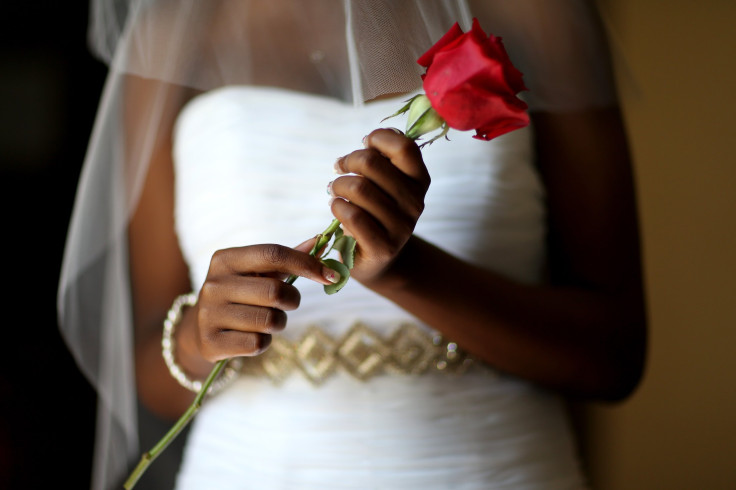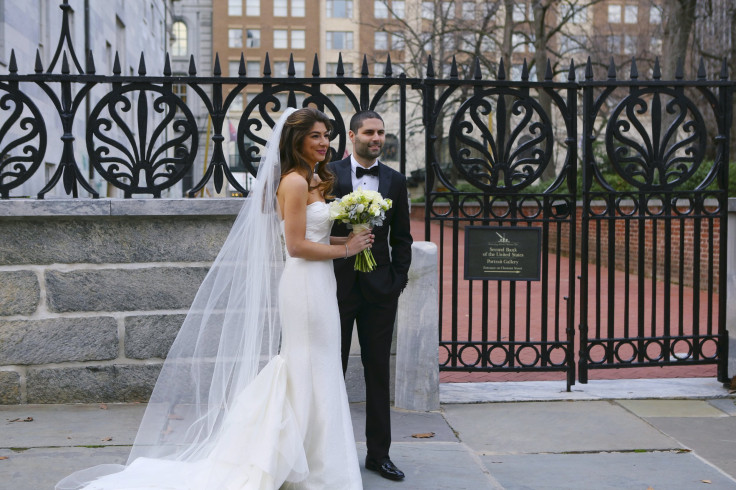Why Mobile Wedding Registries Now Include Bitcoin

Digital media entrepreneur Jessica Naziri recently made waves when she shared photos of her technology-themed wedding, complete with bouquets made of USB cables and portable charging packs for guests instead of sugar coated almonds. She wasn’t the first bride to garner media attention for eccentric nuptials fueled by mobile apps and gadgets.
Earlier this summer a couple from Wales, Elisa Evans and Martin Shervington, broadcast their wedding in virtual reality. Guests watched through headsets as a community manager from the San Francisco startup AltspaceVR officiated the ceremony. Time reported the couple spent $2,531 a piece on their headsets and computer. New technologies and social networks are completely revamping the wedding industry.
Today, there are dozens of popular apps taking the place of wedding planners, while guests are giving gifts of bitcoin or Airbnb bookings instead of fine china.
Read: Cryptocurrency Shopping Guide: How To Shop With Bitcoin
Sometimes the hype around a nascent brand of wedding tech can be misleading. So far, virtual reality wedding footage isn’t a popular ask from millennial couples, according to Brian Johnson, owner of With This Ring wedding films in Nashville. As a matter of fact, AltspaceVR temporarily shut down due to lack of funds. “I think it’s new. It’s a really cool idea. It will take a while for the rest of the industry to catch up,” Johnson told International Business Times. “We were the first in Nashville to use drones. Within a year or two, everyone is using drones.”
Around a third of Johnson’s clients now want drone footage of their weddings. Most prefer the basic drone, a Mavic pro available for an extra $250 per hour, instead of the more advanced Inspire 2 drone that costs $350 per hour. “It opens up all kinds of cinematic possibilities,” Johnson said.
He’s seen all kinds of tech-savvy wedding trends, like 3-D printed cake toppers made from actual scans of the bride and groom’s bodies. These days, it’s commonplace for couples to have their own wedding hashtag, sometimes even live-tweeting or streaming their celebrations on social media. But out of all the ways technology has changed the wedding industry, fintech apps are arguably the most widespread.
Read: Wedding Costs Now Exceed Student Loan Debt: 3 Ways To Keep Your Spending In Check
Like a growing number of wedding vendors, Johnson’s company accepts payments via PayPal and Venmo too. These days, payment apps are completely changing American nuptial traditions. One of the most popular wedding trends is called cash funds, online platforms where guests can give money instead of gifts.

According to brand director Jennifer Spector at Zola, a wedding registry platform used by more than 300,000 couples, two thirds of these couples registered for at least one cash fund in addition to gifts. Giving money to the bride and groom is not a new concept in itself. In many Asian and Middle Eastern cultures, guests traditionally give cash instead of toasters and cake platters. However, in the United States, previous generations saw money as an impersonal gift. Giving money to a bride was a social faux pas nearly as offensive as wearing a white dress to her wedding. Now that it’s more common for couples to live together before marriage, tech-savvy wedding registries are less focused on furnishing a new household.
“The norms around weddings and gift giving are changing as marriage changes,” Spector told IBT. “One of the most popular categories is honeymoon funds.” On both Zola and the similar PayPal-powered platform Honeyfund, the average cash gift is $100 to $115 per guest. Money is often given for a specific experience, like a romantic dinner or a massage during the honeymoon. Zola registries are directly linked to Airbnb too. Cryptocurrency is a new addition to the wedding gift repertoire. Zola users have created two bitcoin cash funds so far.

Although it’s less common, some guests also help pay for vendors or preparation before the ceremony. Spector and her husband registered for boxing classes leading up to the big day. “It helped us get rid of wedding jitters and get in shape for the wedding,” she said. Honeyfund co-founder Sara Margulis also registered for a cash fund, for daytime activities during her honeymoon in Fiji. “I still remember who gave me that [sailing] and I think of all the guests who contributed to our trip. It definitely connected us to those memories and those guests for life,” Margulis told IBT.
More than 742,123 couples have registered cash funds with Honeyfund so far, each raising an average of $1,500 to $2,000. In total, wedding guests have given around $483,354,000 through Honeyfund since the company launched in 2011, plus several dozen bitcoin cash funds. “It [bitcoin] is the modern day version of buying a couple a savings bond,” Margulis said. “Now that the wedding market itself is made up of a majority of millennials, we’re really seeing a lot more fun and different solutions to wedding gifts. More experiences instead of things. Everybody uses tech.”
© Copyright IBTimes 2025. All rights reserved.




















